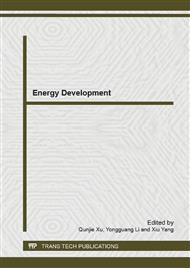p.2470
p.2474
p.2481
p.2486
p.2495
p.2501
p.2507
p.2513
p.2518
Load Scheduling Strategies Based on Dynamic Price in Smart Grid
Abstract:
The combination of renewable energy and dynamic electricity pricing is an important feature of modern smart grid. Due to the dynamic electricity price and the intermittency nature of renewable energy, a local small-scaled smart grid (microgrid) needs to intelligently schedule various work loads to determine their start and end time in order to maximize the utilization of renewable energy and minimize the total electricity cost. Since the workload that can be shifted/scheduled is classified into interruptible load and non-interruptible load, in this paper we present two novel recursive scheduling strategies based on dynamic programming for both categories. The simulation experiment demonstrates that our strategies can effectively save energy expenditure and increase the proportion of renewable energy in overall energy consumption.
Info:
Periodical:
Pages:
2495-2500
Citation:
Online since:
December 2013
Authors:
Price:
Сopyright:
© 2014 Trans Tech Publications Ltd. All Rights Reserved
Share:
Citation:


